Radiofrequency Ablation Procedure in Nagpur
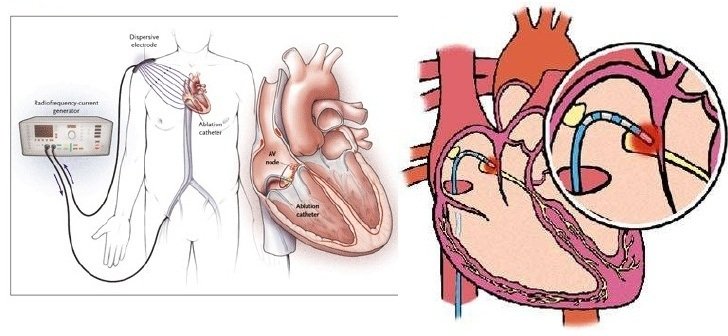
Radiofrequency Ablation (RFA) is a minimally invasive medical procedure that uses high-frequency electrical currents to generate heat, effectively destroying abnormal tissue or cells. It’s commonly employed in treating cardiac arrhythmias by correcting irregular heart rhythms, as well as in managing certain tumors by shrinking or eliminating them. A catheter delivers radiofrequency energy to the target area, guided by imaging techniques. RFA offers advantages such as reduced recovery times, less pain, and lower risk of complications compared to traditional surgery. Despite its effectiveness, potential risks like bleeding and infection exist, necessitating careful consideration and consultation with a healthcare provider.
Procedure of Radiofrequency Ablation
Radiofrequency Ablation procedure is minimally invasive, a catheter is guided to the target area using imaging. Local anesthesia is administered. The catheter emits radio frequency energy that heats and destroys abnormal tissue or cells, addressing conditions like arrhythmias or tumors. The process is monitored in real-time, and once complete, the catheter is removed. Recovery is usually quick, and follow-up assessments track progress. RFA offers a safer and less invasive alternative to traditional surgery for various medical issues.
Benefits of Radiofrequency Ablation
Radiofrequency Ablation of heart offers minimally invasive treatment, precise targeting of abnormal tissue, reduced pain, shorter recovery, and lower complication risks. It’s effective for correcting irregular heart rhythms and treating tumors. Outpatient procedures, minimal scarring, and enhanced quality of life are additional advantages, making it a tailored and efficient treatment option.
Why is Radiofrequency Ablation (RFA) done?
Radiofrequency Ablation (RFA) is performed to treat conditions involving abnormal tissue growth or malfunctioning cells. In cardiac care, it corrects irregular heart rhythms (arrhythmias) by destroying abnormal electrical pathways. RFA is also used to manage certain tumors, as it shrinks or eliminates cancerous or non-cancerous cells. This minimally invasive procedure offers reduced pain, shorter recovery times, and lower risks compared to traditional surgery. It’s chosen when medication isn’t effective or surgery poses higher risks. RFA provides targeted treatment, improving heart rhythm and reducing tumor size, ultimately enhancing a patient’s quality of life.
What Risks are Involved in Radiofrequency Ablation?
Risks of Radiofrequency Ablation (RFA) include bleeding, infection, damage to nearby structures, arrhythmias, pain, blood clots, incomplete treatment, tissue regrowth, and rare complications like heart attack. Careful consideration and discussion with a healthcare provider are essential before undergoing the procedure because Radio Frequency Ablation in India costs you between Rs.88800 to Rs.118400.
What happens during a Radiofrequency Ablation?
During a Radiofrequency Ablation (RFA), a minimally invasive procedure, a catheter is guided to the targeted area using imaging. Local anesthesia numbs the site. The catheter emits radio frequency energy that heats and destroys abnormal tissue or cells causing issues like arrhythmias or tumors. Real-time monitoring ensures precision in radiofrequency ablation of varicose veins. The treatment is usually well-tolerated, with patients possibly feeling a warm sensation. After completion, the catheter is removed. Recovery is relatively swift, and follow-up appointments are scheduled to assess the procedure’s success. RFA offers an effective, low-risk option for addressing specific medical conditions with less pain and shorter recovery compared to traditional surgery.
Types of Radiofrequency Ablation
There are various types of RFA techniques used in different medical fields:
Cardiac RFA
Used to treat certain heart conditions like atrial fibrillation. It involves inserting a catheter with an electrode tip into the heart to target and destroy abnormal electrical pathways.
Pain Management RFA
Applied in chronic pain management, especially for conditions like arthritis or back pain. It involves targeting nerves that transmit pain signals with heat to disrupt their function and provide relief.
Tumor Ablation RFA
Employed in oncology to treat certain tumors, often in the liver, kidney, lung, or bone. The procedure involves inserting a probe directly into the tumor and using heat to destroy the cancerous cells.
Cosmetic RFA
Utilized in dermatology and cosmetic surgery for procedures like radiofrequency skin tightening, where heat is used to stimulate collagen production and tighten the skin.
What Happens After Radiofrequency Ablation Procedure?
After a Radiofrequency Ablation (RFA) procedure, patients are monitored for a brief period. Mild discomfort or a sensation of warmth at the treatment site is normal. Most patients can resume light activities within a few days, depending on the specific procedure and individual factors. Pain relievers might be recommended to manage any radiofrequency ablation side effects. Follow-up appointments are typically scheduled to assess the procedure’s effectiveness and monitor the patient’s progress. Overall, the recovery process is relatively quick, and RFA offers a minimally invasive way to address conditions like arrhythmias or tumors, with lower risks and faster recovery compared to traditional surgical methods.
Just like the metropolitan cities, the best cardiologist is now available in your very own city Nagpur. Dr. Chetan Rathi is a heart genius and looks into all the matters of the heart such as varicose veins radiofrequency ablation. Visit him if you experience any heart related inconveniences.
Our Medical Services

ECG
An electrocardiogram (ECG) is one of the only and speediest tests utilized to survey the heart. Anodes (small, plastic patches that stick to the skin) are set at certain spots on the chest, arms, and legs.
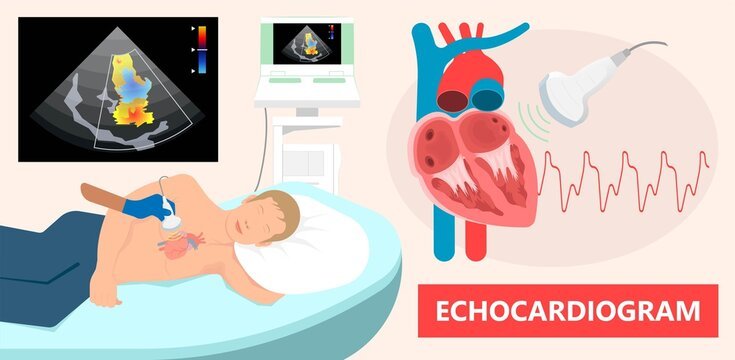
2D Echo
A two-dimensional Echocardiogram or 2D Echo test is a demonstrative test that employs ultrasound waves to evaluate the working of the heart.

Holter Monitoring
Holter monitoring measures your heart activity over an extended period, usually between 24 and 48 hours. Basically, a Holter Monitoring is a portable device which records the heart’s electrical signals.

BP Monitoring
Each time your heart beats, it pumps blood into your arteries. A blood pressure measurement may be a test that measures the force (pressure) in your arteries as your heart pumps.

Coronary Angiography
Coronary angiography diagnoses and evaluates coronary artery blockages. Contrast dye is injected into arteries, enabling X-ray imaging to visualize blood flow and identify narrowing or blockages.
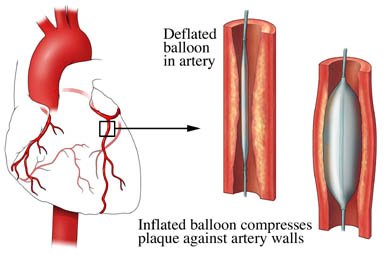
Coronary Angioplasty
Coronary angioplasty is a minimally invasive technique of abdominal artery angioplasty, which is used to treat coronary arteries that are obstructed or constricted and it is the most appropriate technique used by doctors for the treatment.
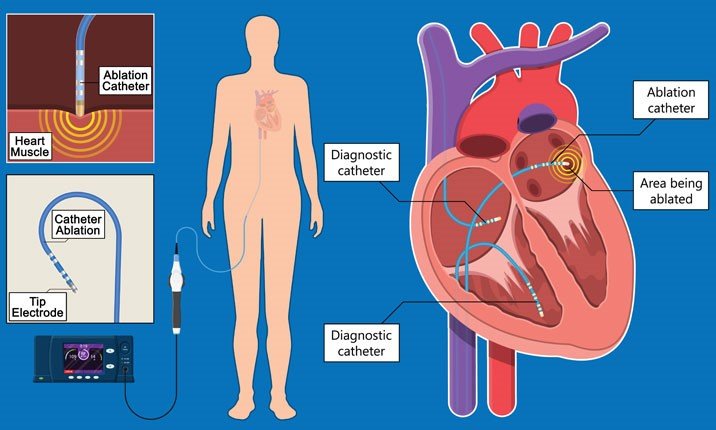
Electrophysiology Study
An Electrophysiology Study (EP study) is a test utilized to assess the heart’s electrical framework and check for abnormal heart rhythms. The natural electrical impulses coordinate the contractions of different parts of the heart.

Best Cardiologist in Nagpur
Introducing Dr. Chetan Rathi, a distinguished Cardiologist in Nagpur, whose eminence transcends the realm of medical proficiency.
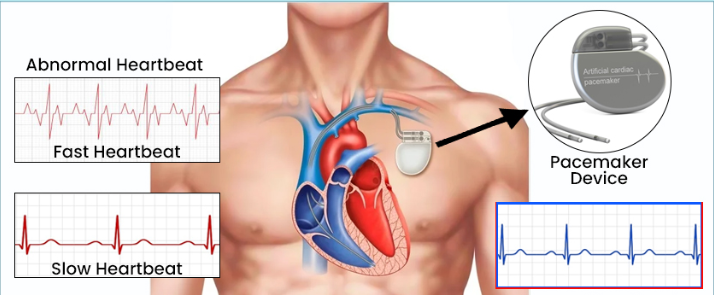
Pacemaker Implantation
Pacemakers are medical devices designed to support and regulate the electrical system of the heart, ensuring it functions properly. This medical procedure entails the insertion of a small device into the chest region.

ICD Implantation
An Implantable Cardioverter-Defibrillator (ICD) is a life-saving device that plays a crucial role in monitoring and regulating heart rhythms. It consists of a pulse generator and leads implanted in the heart.

CRT_P & CRT-D Implantation
CRT implantation is a process in which technological instruments known as CRT-P and CRT-D where p stands for pacemaker and d stands for defibrillator.

Valvuloplasty
A balloon mitral valvuloplasty is a process to extend a restricted heart valve and improve blood flow. The heart valves handle how blood drives through the heart.
Our Achievements in Numbers
Happy Patients
Years of experience
Specialisations
Hospital Associations
Awards & Recognition
Patient Testimonials
Dr Chetan Rathi sir is good cardiologist. I visited him many times with my family and friends for consult about issues related with cardiology.
Our Videos




Our Blog
 How Does Vitamin D Affect Your Heart?
How Does Vitamin D Affect Your Heart?
Vitamin D is much more than the “sunshine vitamin”; it is very important in the whole body of heart health. It works from bone health to an enhanced immunity function. Scientific studies show that this regulates cardiovascular health; therefore, it is a very great factor in preventing heart diseases and maintaining optimal heart function. This… Continue reading How Does Vitamin D Affect Your Heart?
Read More Understanding Diabetes: Causes, Symptoms, and Management
Understanding Diabetes: Causes, Symptoms, and Management
Diabetes mellitus is a chronic condition that affects the way your body processes glucose, or sugar. Unchecked, diabetes mellitus can lead to serious complications, such as heart disease and kidney damage, as well as nerve problems. Understanding the types of diabetes, the symptoms of diabetes, the causes of diabetes, and how to take care of… Continue reading Understanding Diabetes: Causes, Symptoms, and Management
Read More What Is Syncope and How Can It Be Prevented and Treated?
What Is Syncope and How Can It Be Prevented and Treated?
Syncope, also known as fainting, is a short-lived loss of consciousness which primarily results from a sudden decrease in blood flow to the brain. Although fainting can be alarming, syncope is generally not a serious condition and can be caused by a variety of reasons; however, it may indicate an underlying serious medical condition in… Continue reading What Is Syncope and How Can It Be Prevented and Treated?
Read More



